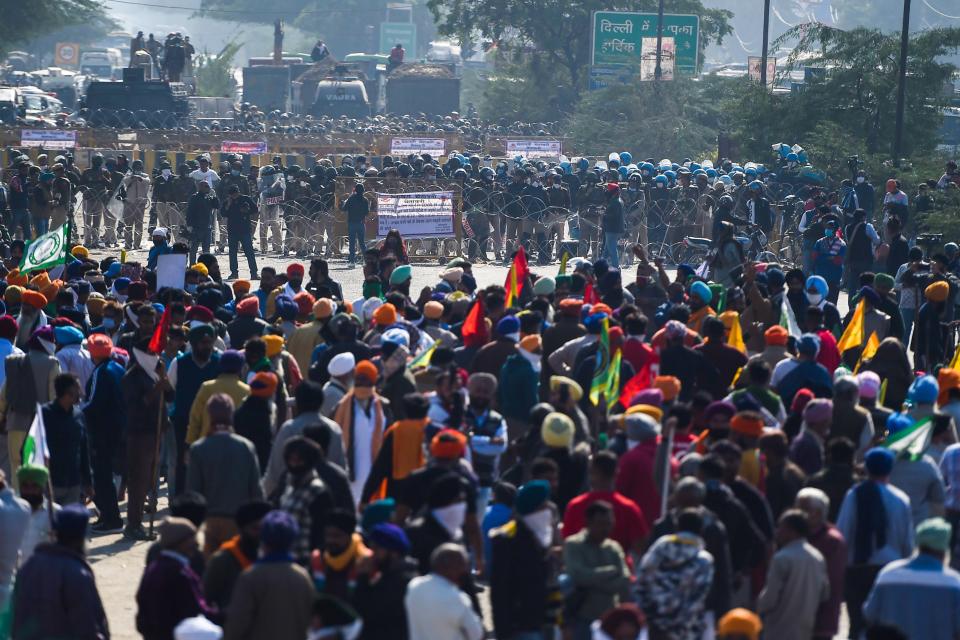Angry farmers threaten to besiege Delhi as protests outside Indian capital enter fifth day

Police block a street to impede farmers from marching to New Delhi to protest against the central government's recent agricultural reforms at the Delhi-Haryana border in Kundli on November 27, 2020.
(AFP via Getty Images)India’s farmers have intensified their protests against the controversial farm laws in Delhi, as the fifth day of the agitation was marked by a series of road closures besieging the national capital.
On Sunday, the farmers announced that they would begin blocking five entry points to the capital city — Sonipat, Rohtak, Jaipur, Ghazipur, Hapur and Mathura, covering the all three states the city has major entry points from.
The impact of the protests is being witnessed most in the northern and western areas of Delhi, which borders the state of Haryana, as the city traffic police advised the commuters to avoid Singhu and Tikri borders. The police in Ghazipur, the capital’s border with the neighbouring Uttar Pradesh, placed concrete barriers on the highway in order to prevent the rising number of farmers to enter into the capital.
Anger against the Modi government’s new farm laws has been simmering in the northern states of India, especially in the agri-hubs Punjab and Haryana, where the protests have been ongoing for weeks.
The tussle between the central government and the farmers escalated on 26 November, when thousands of farmers from Punjab and Haryana decided to march towards the capital city to put pressure on the Narendra Modi-led federal government.
Protests continue at the Singhu Border amidst heavy police deployment. No movement towards Burari Ground. More deliberations taking place among farmers. @IndianExpress pic.twitter.com/ltcrWP5jUv
— Amil Bhatnagar (@AmilwithanL) November 30, 2020
However, the centrally controlled Delhi police used water cannon and tear gas shells on the protesting farmers, including beating them up with sticks, drawing widespread criticism from the people, opposition parties and celebrities.
The Haryana government, in an unprecedented move, also dug-up the national highway in order to prevent farmers from entering.
Prohibitory orders under Section 144 of the Indian law were imposed in several parts of Haryana to prevent the assembly of protesters. The bus service to Punjab from Haryana has been suspended too.
Highway dug up but cannot deter the kisans from marching forward. pic.twitter.com/MECRK9VmJH
— Sitaram Yechury (@SitaramYechury) November 28, 2020
बड़ी ही दुखद फ़ोटो है। हमारा नारा तो ‘जय जवान जय किसान’ का था लेकिन आज PM मोदी के अहंकार ने जवान को किसान के ख़िलाफ़ खड़ा कर दिया।
यह बहुत ख़तरनाक है। pic.twitter.com/1pArTEECsU— Rahul Gandhi (@RahulGandhi) November 28, 2020
At the centre of the protests are three new controversial agricultural laws passed by the Modi government on 17 September, that they say will provide a 'one nation, one market’ option to farmers and attract private investment in the sector.
But farmers’ rights groups say the new laws will lead to the corporatisation of agriculture and dismantle the minimum support price (MSP) system that ensures a safe price for farmers in the government-controlled Mandis (markets).
Farmers are pushing the Union government to either withdraw the three new legislations or guarantee them the minimum support price for their crops.
The opposition parties have suggested the government passed the law without taking the farmers’ objections into consideration and must listen to them.
India’s prime minister, speaking at a highway inauguration event in his constituency Varanasi on Monday evening, hit back at those criticising the law saying that “some people are trying to trick farmers for votes”.
“Farmers are being empowered by giving them the option of a bigger market,” he said.
Union Home minister Amit Shah, Defence minister Rajnath Singh and Agriculture minister Narendra Singh Tomar held deliberations over the farmers' protest with BJP president J P Nadda late on Sunday evening.
A meeting of the protesting farmers' unions has already been scheduled on 3 December. However, the farmers are planning to escalate their protests in the coming days.
Read More
Indian police open fire with tear gas and water cannon on farmers
Indian farmers burn effigies of Modi as anger against PM mounts
In Delhi, we have to make a choice – protection from smog or virus

 Yahoo Finance
Yahoo Finance 